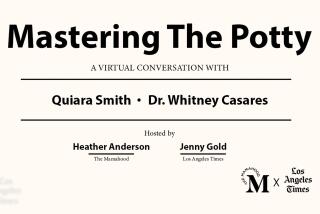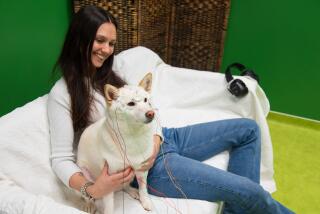Brain wave study sheds light on autism among toddlers
How an autistic baby’s brain fires up in response to words at 2 years of age may predict how well that child will learn language and even think and behave later in life, a new study shows.
The research, published this week in the online journal PLOS One, suggests that a “social gateway” based in the brain impedes not only early language processing, but a broader spectrum of cognitive development, including the ability to adapt behavior to circumstances, according to Patricia Kuhl, who studies early language and brain development at the University of Washington’s Institute for Brain and Learning Sciences.
Researchers measured the electrical impulses of the brain of 2-year-old autistic babies enrolled in an early intervention study. They later analyzed language and cognitive abilities at ages 4 and 6. It turned out that how and where the brain becomes active while processing words correlated strongly with a range of abilities later in toddlerhood, Kuhl and her team found.
“It’s like you’re predicting the ability to learn, and not just learn language, but just plain learn,” Kuhl said. “And that’s a complete shocker.”
Most babies at about six to nine months are “universal perceivers,” able to distinguish sequences of subtle sound changes in any language to which they are exposed, long before they have any meaning as words, previous research has shown. Their brain already is engaging in statistical learning.
“They are taking into account how frequently sounds are presented,” Kuhl said.
What fired Kuhl’s curiosity, though, was how excited and engaged typical infants were during test sessions in which they played with adults while hearing recorded language from native speakers.
What role were the adults playing? Kuhl wondered. She exposed the babies to videos instead. By outward appearance, the infants seemed just as engaged and excited. But tests showed their statistical learning had not improved. They hadn’t picked up on the subtleties of new sounds.
“We were just blown away,” Kuhl said. “My God, they weren’t learning a thing. So they either learned perfectly in the live situation, or they learned nothing, in the TV or audio-only.”
Such video deficits are relatively well-known, and they lend strength to theories that humans, a quintessentially social animal, cannot master the fundamentals of learning outside of a social context. Evolution seems to have twined a social strand with a cognitive-developmental strand.
Kuhl turned to autistic toddlers, who tend to be disinterested in human faces, don’t respond the same way to a mother’s voice, and prefer objects over people.
EEG responses to language components have been shown to be good predictors of future language and cognitive development among typically developing children. They can accurately predict, for instance, how ready for reading a child will be at 5.
But a reliable brain-based predictor for toddlers with autism had so far eluded scientists. Kuhl set out to find one.
Her team collected data for about five years before comparing the EEG information with later tests of language, cognitive and behavioral abilities. As expected, autistic brains generally fired up differently as a group -- activity was not as localized in specific language-related areas of the brain, as it typically is by age 2.
But when Kuhl divided the autistics by their spectrum of social abilities, she found those with higher skills showed brain activity roughly in the same focused area where typical brains process language. There was, however, a slight difference in which electrode was picking up activity in the temporal-parietal regions. It was close by, but not the same one that registered a response among normal babies.
It was this electrode response that turned out to be a strong predictor of how the children fared intellectually at ages 4 and 6. In fact, the correlation grew stronger over time, and was a more robust predictor than a standard cognitive test often used to assess autistic toddlers.
Kuhl believes the work strengthens her theories on the social roots of learning, and hints at an intriguing neurobiological basis for the process.
“I had been arguing that social learning isn’t just about language, it’s about just about everything we do,” Kuhl said. “You learn the habits and mechanisms of interaction in the culture through watching other people.”
A mother who points to a ball confirms the meaning of a sound the baby’s brain has been storing and sorting. But if a baby doesn’t follow that gesture, or pay attention to a mother holding a ball, that learning can slow down at a crucial stage. That has been one of the central heartbreaks for parents with autistic babies.
Kuhl will try to replicate the findings and expand on the work by using more sophisticated machinery that can delve more deeply into the brain’s circuitry. She hopes the research could wedge open the social gate that seems to be closed in the brain of autistic infants.
“You’ve got to understand a way to get in when that gate is not open for kids with autism,” Kuhl said. “How do you get in?”







